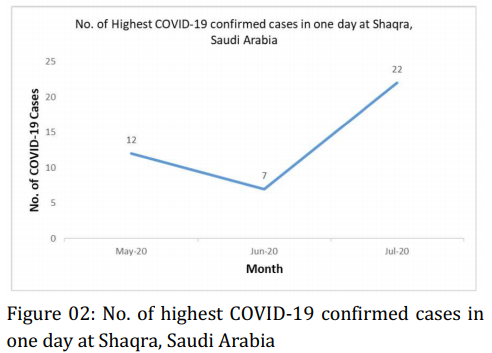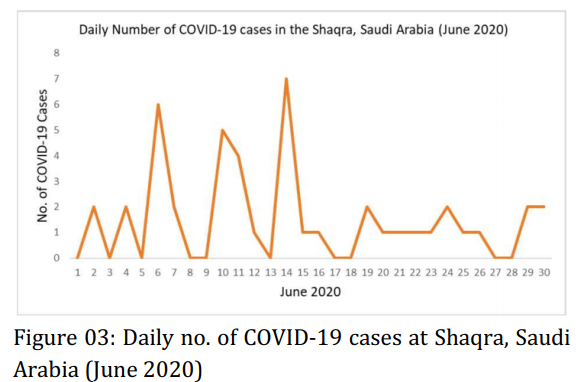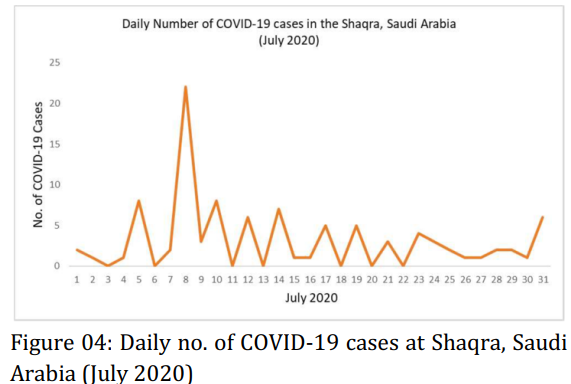Department of Internal Medicine, College of Medicine, Shaqra University, Shaqra-11961, Saudi Arabia Email: dr.aslam@su.edu.sa
Coronavirus disease 2019 (COVID-19) is a respiratory tract infection caused by a newly emergent coronavirus, SARS-CoV-2, that was first recognized in Wuhan, China, in December 2019. In the Shaqra, the total number of COVID-19 confirmed cases reported was 183 and recovered cases was 148 with 03 reported mortalities till the 11 August 2020. In Shaqra, there was a 73 % increase in the COVID-19 confirmed cases in June 2020 as compared to May 2020 and 273 % and 200 % increase in the COVID-19 confirmed cases in July 2020 as compared to May and June 2020 respectively. The highest number of COVID-19 confirmed cases reported in May, June and July 2020 was 12, 07 and 22 respectively. Multiple precautionary steps were taken to prevent the spread of Coronavirus disease 2019 (COVID-19) in Saudi Arabia by the many government agencies.
KeywordsCOVID-19, Prevalence, Ministry of Health, Saudi Arabia
Coronavirus disease 2019 (COVID-19) is a respiratory tract infection caused by a newly emergent coronavirus, SARS-CoV-2, that was first recognized in Wuhan, China, in December 2019. Genetic sequencing of the virus suggests that SARSCoV-2 is a betacoronavirus closely linked to the SARS virus.[1]The World Health Organization (WHO) has declared the COVID-19 outbreak a pandemic on 11 March 2020 and till the 13th August 2020 WHO reported the 20,439,814 confirmed cases, 744,385 deaths and 213 countries, areas or territories with cases worldwide affected.[2]
In Shaqra, the total number of COVID-19 confirmed cases reported was 183 and recovered cases was 148 with 03 reported mortalities till the 11 August 2020.[3] The Total number of cumulative confirmed cases reported in May, June and July 2020 was 26, 45 and 97 respectively (figure 1). There is 73 % increase in the COVID-19 cases in June 2020 as compared to May 2020 and 273 % and 200 % increase in the COVID-19 cases in July 2020 as compared to May and June 2020 respectively.[4]
The highest number of COVID-19 confirmed cases reported in May, June and July 2020 was 12, 07 and 22 respectively (figure 2). The graphical presentation of the daily number of COVID-19 confirmed cases in May, June and July 2020 given in Figures 3,4 and 5 respectively. In Saudi Arabia, total confirmed cases reported were 291,468 and recovered cases were 255,118 with 3, 233 reported mortalities till 11 August 2020. Total number of active cases was 33,117 with 1,821 critical cases reported till the 11 August 2020 as per the Ministry of Health, Covid19 Command and Control Center (CCC), The National Health Emergency Operation Center (NHEOC).[3],[4]





Multiple precautionary steps were taken to prevent the spread of Coronavirus disease 2019 (COVID19) in Saudi Arabia, with the cancelation of many congregational events in KSA including the Riyadh International Book Fair and the Saudi Arabian International Horse Festival which was held on 5 March 2020. The KSA suspended its e-Visa
programme, placed a ban on inbound travel of persons from COVID-19-affected countries, and placed restrictions on travel from and to the neighbouring Gulf countries. On 7 March 2020, KSA limited international flights to the three major airports within the Kingdom. On 7 March 2020, KSA required a Coronavirus disease 2019 (COVID-19) negative-certificate for any arriving travellers. Since the initial cases were reported from the Qatif region, this area was put in lockdown on 8 March 2020. On 8 March 2020, the Saudi Ministry of Education announced the closure of schools and universities. There was prohibition of gathering and wedding ceremonies on 13 March 2020. All international flights were suspended effective 15 March 2020 and all arriving travellers were placed in quarantine for 2 weeks.[5]
On 17 March 2020 Saudi Arabia suspended all Friday and other main prayers at mosques across the Kingdom as part of efforts to stop the spread of the coronavirus. The only prayers permitted to continue outside the home will be at the Two Holy Mosques in Mecca and Medina. On 21 March 2020, there were further bans on local flights, train and
bus transportation. On 22 June 2020 The Ministry of Hajj and Umrah decided Hajj 2020 to be held with a limited number of pilgrims and done successfully. Saudi Arabia introduced a full day lockdown and curfew across the Kingdom during the Eid holidays from 23 May 2020 until 27 May 2020 to prevent the spread of COVID-19 infection
To prevent the COVID-19 infection the Saudi Ministry of Interior announced that people who don’t wear face masks or fail to adhere to social distancing rules will be fined SR 1,000; People who refuse to be checked for temperature when entering public or private sectors buildings will also be fined SR 1,000; Establishments that fail to
provide disinfectants and sanitisers at designated slots will be slapped with a fine of SR 10,000; Establishments that don’t sterilise shopping carts and baskets after each use or those who don’t measure the temperature of both employees and visitors at the entry points of shopping centres and malls will also face a fine of SR 10,000; Additionally, the establishments that fail to sanitise commonly used facilities will face the same fine (SR10,000);
The ministry emphasised that private sector facilities that allow people to enter their premises without wearing medical or cloth masks will incur a fine of SR 10,000, adding that such fines are aimed at organising gatherings and making social distancing mandatory, as it is the leading cause of coronavirus outbreak; It urged all members of the
public to adhere to precautionary instructions, social distancing rules, and avoiding all forms of gatherings. A maximum of 50 people will be allowed to attend family or non-family gatherings inside homes, farms, or rest areas or to be involved in social gatherings such as weddings or mourning tents.
Besides, Saudi Arabia government take a following preventive decision to stop the spread of COVID-19 infection: Suspension of attendance at workplaces in all government agencies for 16 days, except for the health, security, and military sectors, the Electronic Security Center, and the remote learning system in the education sector; Closure of closed and open commercial markets and malls, except pharmacies and food supply stores such as supermarkets, hypermarkets and the like, provided that they commit to sterilizing their shopping carts after being used by each client. This procedure does not include the shops located on commercial streets, provided that they are not within
commercial complexes; Closure of men’s barber shops and women’s beauty salons; Banning of serving food and beverages in restaurants and cafes limiting their services only to take away requests and delivery, and customers are not allowed to sit at the designated service tables on the premises; Banning of gatherings in public places designated for recreation such as parks, beaches, resorts, camps, wild parks and the like; Stopping all auctions and auctions activities and temporarily close their gathering sites; Limiting the presence of the public in government departments by enhancing electronic transactions and activating platforms for providing electronic services remotely, in the service sectors of all government and private agencies, and limiting commercial dealings with companies and their representatives to electronic and telephone communication as much as possible; The Ministry of Human Resources and Social Development encourages companies, private institutions, and charitable societies to reduce the number of employees attending workplaces and to promote electronic work remotely through the available electronic means with the continuity of basic and sensitive work for the security and health sectors; Grant the opportunity to work remotely to the following categories: and the following categories: pregnant women, those with respiratory or cardiac diseases, HIV or hereditary diseases, and users of immunosuppressive drugs, and those who are undergoing treatment from tumors, provided that they present a medical report that does not exceed one month of age; Demand all companies and institutions to enforce a policy of requiring all their expatriate employees returning from travel to selfquarantine for a period of 14 days from the date of their arrival before commencing their work, as well as applying the same policy for those showing respiratory symptoms without having traveled recently.[5]
These social precautions and actions were intended to stop and slow the development of COVID-19 cases in the KSA.
References
- 1.Pathan A. Current off-label Pharmacotherapeutics in the management of novel coronavirus disease (COVID-19). NeuroPharmac J. 2020; 5(1): 108-112. DOI: 10.37881/1.511 [Google Scholar] [PubMed]
- 2.World Health Organization (WHO). Coronavirus disease 2019 (COVID-19) dashboard. 62, Geneva, Switzerland: WHO; 2020. https://covid19.who.int/ [Google Scholar] [PubMed]
- 3.Ministry of Health, Covid19 Command and Control Center (CCC), The National Health Emergency Operation Center (NHEOC), Saudi Arabia; 2020. https://covid19.moh.gov.sa/ [Google Scholar] [PubMed]
- 4.Ministry of Health, Saudi Arabia (SaudiMOH), daily report, Coronavirus disease (COVID-19) 2020; https://twitter.com/SaudiMOH [Google Scholar] [PubMed]
- 5.Al-Tawfiq JA, Memish ZA. COVID-19 in the Eastern Mediterranean Region and Saudi Arabia: prevention and therapeutic strategies. Int J Antimicrob Agents. 2020;55(5):105968. DOI:10.1016/j.ijantimicag.2020.105968. [Google Scholar] [PubMed]

